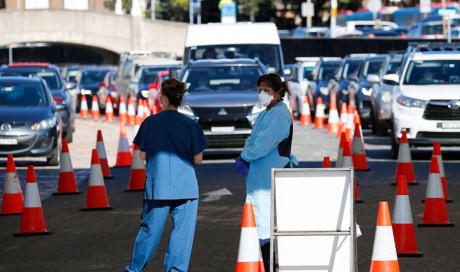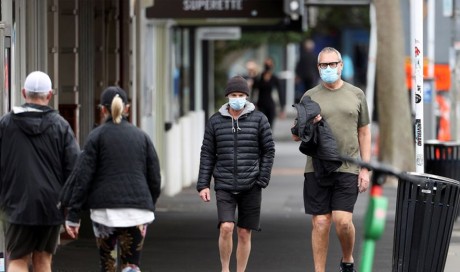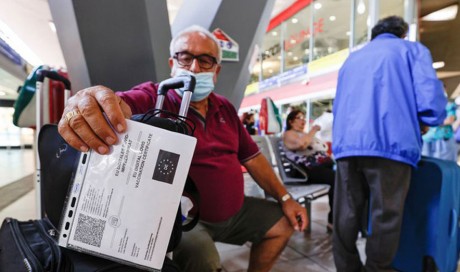Turkish attempts to hold rallies in Germany, Austria, Switzerland and the Netherlands have been blocked.
Turkish President Recep Tayyip Erdogan vowed retaliation, saying: "Nazism is still widespread in the West".
German Chancellor Angela Merkel rejected the comments as unacceptable and offered the Netherlands her "full support and solidarity".
On Monday, the Dutch foreign ministry issued a new travel warning, urging its citizens in Turkey to take care and noting the new "diplomatic tensions".
The warning to "avoid gatherings and crowded places" came as Turkey's foreign ministry lodged a formal protest with the Dutch envoy.
Meanwhile, the Dutch deputy prime minister, Lodewijk Asscher, said that "to be called Nazis by a regime which is walking backwards in regards to human rights is just disgusting".
- Why is Turkey holding a referendum?
- Turkey row: Why has Erdogan riled Nato allies?
The row spilled over into the campaign for Wednesday's general election in the Netherlands, with Prime Minister Mark Rutte defending in a live TV debate his decision to stop Turkish ministers addressing Dutch Turks.
His opponent, Geert Wilders of the far-right, anti-Islam Freedom Party, said the real problem was that Turks waving Turkish flags on a Dutch street had shown where their loyalties lay.
European Union leaders called for calm.
"It is essential to avoid further escalation and find ways to calm down the situation," said a joint statement by foreign policy chief Federica Mogherini and enlargement commissioner Johannes Hahn.
The BBC's Mark Lowen, in Istanbul, says that Turkey and the Netherlands, two Nato allies, are now locked in an "unprecedented diplomatic crisis".
How did the row come about?
The proposed rallies aimed to encourage a large number of Turks living in Europe to vote Yes in a referendum on 16 April on expanding the president's powers. The plans were criticised by senior EU officials on Monday.
In Germany, for example, there are more than three million people of Turkish origin, of whom an estimated 1.4 million are eligible to vote in Turkish elections. In effect, the diaspora is Turkey's fourth-largest electoral district.
Planned rallies in Germany, Austria and the Netherlands were blocked after officials cited security concerns or said the rallies could stoke tensions.
A gathering in France went ahead, however, after officials said it did not pose a threat.
Two Turkish ministers were barred from addressing rallies in the Dutch city of Rotterdam, with one of them escorted to the German border.
Police used dogs and water cannon against protesters waving Turkish flags in Rotterdam.
- Erdogan chases diaspora vote - but ties fray
- Erdogan rallies not welcome in Austria
- Turkey says 'No' to saying 'No'
How did Turkey respond?
Mr Erdogan likened the Netherlands to "a banana republic", demanded international organisations impose sanctions on the Netherlands, and accused countries in the West of "Islamophobia".
"I have said that I had thought that Nazism was over, but I was wrong," he said.
He later lashed out at the German chancellor.
"Mrs Merkel, why are you hiding terrorists in your country? Why are you not doing anything?" he said, in comments quoted by AFP. "Mrs Merkel, you are supporting terrorists."
Turkey has previously accused Germany of harbouring Kurdish militants and suspects wanted over the failed coup attempt of 15 July last year.
Turkey's EU affairs minister, Omer Celik, said Ankara would retaliate against the Netherlands. He later suggested reconsidering part of a deal with the EU aimed at curbing an influx of migrants, namely Turkey's efforts to prevent them crossing by land to Greece and Bulgaria.
On Monday morning, the Dutch charge d'affaires in Ankara was summoned for the third time in three days in protest against the treatment of the minister escorted to Germany and the treatment of protesters in Rotterdam.
- Reality Check: Is banning rallies EU policy?
- Turkey-Netherlands row: Press reaction
What did European countries say?
Mr Rutte said Mr Erdogan's comment that the Dutch were "Nazi remnants" was "unacceptable", and demanded an apology.
Responding to Turkish calls for sanctions, he said the Netherlands would "never negotiate under threat".
In a news conference on Monday, Mrs Merkel said she had condemned Nazi analogies made by Mr Erdogan about Germany the previous week.
"This rejection is also valid for our allies. These comparisons are completely misguided... particularly in the Netherlands that endured so much agony through the National Socialists," she said.
"That's why the Netherlands can count on my complete support and solidarity in this."
Danish Prime Minister Lars Lokke Rasmussen said he had postponed a meeting later this month with his Turkish counterpart Binali Yildirim because "with the current Turkish attacks on Holland the meeting cannot be seen separated from that".
Share This Post















